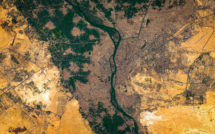

Translated from the Italian by Diana Thow.
The hallucinatory, incantatory verse of the Rome-based, Albanian poet and sound artist Jonida Prifti (b. 1982) is forceful and embodied. Like the voice that animates the poem “Ariola,” it remains just beyond our reach. Prifti moved to Rome to study at La Sapienza University in 2001, and began to write in Italian soon after. Given her biography, critics often try to categorize her work under the umbrella of immigrant writing (“scrittura migrante”), a popular form of writing usually built around personal experiences and narratives. Prifti’s work does not, however, fit easily in this category: it eschews representing the “immigrant experience” in order to experiment instead with the ruptures of meaning and linguistic strangenesses produced at the border of multiple languages and cultures.
The two poems in this selection come from her collection Ajenk [The Wedding Party] (Transeuropa Edizioni, 2011). Both poems are elegies that build from memories of a specific place. The prose poem “Ariola” was inspired by a desire to connect with a long-lost friend in Durazzo, Albania, and the poem reaches across languages and borders to speak to her. “The only illusion is that there’s a road to follow toward an end” the poem begins, and the image of the tunnel, of the connective passageways formed in language, are constantly disrupted and distorted even as the poem tries to establish them. The surreal, disjointed imagery, idiosyncratic Italian, and staccato rhythm of the words flow freely in the hybrid form of the prose poem. The language of the poem, its estranging syntax and grammar, creates a haunting portrait, and a nostalgic imprint of a connection that can no longer exist.
Prifti composed the titular poem “Ajenk” [“The Wedding Party”] in memory of a favorite uncle killed unexpectedly in an car accident. What seems to be a traditional wedding song is eventually overwhelmed by its own relentless rhythm, as the ominous threat of domestic violence emerges. It was first written in Albanian and translated into Italian by Jonida’s sister, Dafina Prifti, a translator and scholar, in collaboration with the poet; that Italian version is the basis of my own translation.
The video-poem version of “Ajenk,” produced by Jonida with Andrea Noce and included in this feature, highlights the linguistic, temporal, and formal boundaries enacted by the bilingual poem. In the video blurred bucolic images of Albania appear, with the singsong voice of Prifti, speaking in Albanian, in the background. The video was shot in Orize, a neighborhood in Prifti’s hometown of Berat. The video distorts a visual narrative to recreate the blurring of boundaries of time and space, an allusion to the suspended time of the traditions of Albanian wedding parties, which last four days. For Prifti the wedding party is “a moment in which generations meet and blur into one another,” and here the blurring is not only temporal and visual, but linguistic as well, as Prifti performs the poem in her regional Albanian. At the same time, the poem insists upon the female voice as a conduit between and among languages.
Since 2008 Prifti has performed with Stefano di Trapani under the name Acchiappashpirt (a compound of acchiappare, the Italian verb for “to catch,”and shpirt, Albanian for heart, spirit, soul), a collaborative project interested in creating connections between the two languages through poetry, music, and sound experiment. When I first met Jonida in Rome and heard her perform, I was mesmerized by the raw energy she employs in the performance of her poetry. Her performance is as much operatic aria as poetic recitation, violent spurts of joy and pain, a linguistic babel particular to her own unique presence on stage. Her performance is already, unto itself, a form of translation of the written word into a new execution, a new form.
—Diana Thow for EuropeNow
Ariola
The only illusion is that there’s a road to follow to an end: the hallway inhabits a closed door hourly. The mystery of a dark legend buried inside a tunnel where children grow into adult visions. Reaching the door, she stops, pale, without keys, powerless before the words that make the wall slant; at a diagonal the lock draws the lines of a pit that vomits snakes. Snakes and larvae, mold, and the hollow of tombs. Darkness, fierce blue wall, they crush the room made of carnivorous nerves, flowers of god, carnivorous flowers of god; spatial the courtyard hides pans full of water where the flesh of the flower called God stagnates. So the evening a mystery, when something holds tight, dust that smells like a weary elevator; consistency dangles in a planned direction and it stops just in the middle between an exit and a closure.
An arc of butterflies slips above the tracks turned sketches at the vigorous pushing and they tear blue velvet over the material oozing with exotic numbers. In that arched middle of the tunnel the step lifts glimpses of fear into the air; the watchman’s invitation on the other side of the tunnel tempts. Feet embedded in the cement with stones, nailed, sculpted in the hinterland; let your head of tiny pores slip inside the door in fits and starts. That voice, so far away, in between a black door and a curve of light: If you see ahead. If you don’t cross me throw yourself down! The jealous watchman in a white jumpsuit against the light throws the hatchet. With your nails you seize it, you put it in the middle of the circle. The center.
Paranoia of arid times may the wind over your knees paralyze you! The exhilarating finger thick with moles sculpts orgasms at the moon’s blooming the petals suck entering liquids in that complex planetarium where the orbit leads to the slippage. Tattoos the evening’s back gently aligned with the middle of the breasts.
Ariola rests the black umbrella on the ground as if it were a tent on the hillside and her soft breast crumbles in the tawny valley. You shouldn’t watch, it’s a love affair: a delicate union that has long deserved an applause. They don’t understand those old pits that know how to release worms and not flowers.
-You dear, strip your belly! let me eavesdrop on your umbilical ligaments!
“My father doesn’t want it and my mother analyzes organs all over the woods. In her laboratory smoke and snakes they boil brains in pots on a low flame they cook lips and tongues of veal. The river in lumps reflects the house in branches and in wavy hair. Everyone upon waking sprays milk at the ceiling to reach the high moor, beyond the antenna in a religious direction, touching a flower they call God.”
Large arms await a return, heat up the pallor before the television, the watchman wavers unwell. The umbrella saves the dead mass of the skull. Ariola bound with tense hands awaits someone to pull her out of her trepidation. Nine brothers in a circle pull out her thick hair in weaving violence. Pulsating, her eyelashes extend black borders between the outline of a ghostly tunnel and the nomadic skull of Ariola.
The Wedding Party*
Put down those hatchets, man!
bullets detonate one after the other
into the bursting heads
running like rabbits
slip on the colorful carpets
for four dawns
they mow the grass with cracked nails
when the river vomits
salt uprooted by pigs
Like a control tower nails down ideas
the father surrenders in the uproar
of a newly-risen sun
orchestrates the party.
In bed he dreams of being there
in the bones’ deep curve.
Hurry, Hurry, the jopingas[1], my son!
The party
hey, fix up the grass with that pitchfork damn you, dammit!
the party
with red fingers
the party
nourishes the mosquitoes
the party
those heads of copper
the party
thirsty as walkers
the party
they walk and walk
the party
to find the limits of their voices
the party
hey the party
of the daughter to be married
the bride comes out of the chimney
the party the party
decked out the groom laughs
the party the party
poor papa he hammers nails
the party the party
the mother is dressed in tatters
the party the party the party
she counts her beads like bones
the party the party the party
when will you come by the house
the party the party the party
will you take uncle along?
the party the party the party
he weeps over the marble walls
the flowers child don’t trample them
the party the party the party
uncle I’m carsick
no child no hang on
hey uncle the dress is torn
the party the party the party
hey uncle the bride has a rope around her neck!
No, it’s lipstick child
no uncle it’s a red rope.
the party girl the party
candies candies me too uncle
the party the party the party
*original written in Albanian and translated into Italian by Dafina Prifti, in collaboration with the poet.
AJENK video poem:
[1] Albanian working shoes made from plastic and rubber usually worn in the fields (poet’s note)
Jonida Prifti is an Albanian poet/performer/singer, translator/interpreter born in the city of Berat. Her publications include Cengel (Ogopogo 2008), Ajenk (Transeuropea Edizioni, 2011), Paesaggio 013 (Caratteri Mobili, 2013), Oriane (HD 2017), and Rivestrane (Selva 2017). She is also the author of “Patrizia Vicinelli’s Poetry and Action” (Onyx, 2014), and with the musician Stefano Di Trapani she performs throughout Europe and Italy as “Acchiappashpirt.” She lives in Rome, Italy.
Diana Thow’s translations include Amelia Rosselli’s Hospital Series(Otis Press/Seismicity Books, 2017) and Impromptu (Guernica Editions, 2014). Her translation, with Sarah Stickney, of Elisa Biagini’s The Guest in the Wood(Chelsea Editions, 2013) won the 2014 Best Translated Book Award. She holds an MFA in literary translation from the University of Iowa, and is a doctoral candidate in Comparative Literature at the University of California, Berkeley, where she specializes in Italian, French, and Translation Studies.
Published on December 11, 2018.




